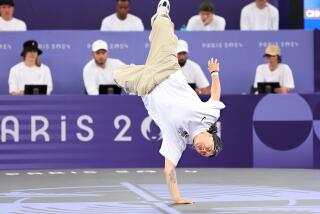Hughes Makes the Leap From Fourth to Golden
- Share via
SALT LAKE CITY — Returning the spotlight to the drama of individual triumphs that are the foundation of the Olympics, Sarah Hughes of Great Neck, N.Y., staged a stunning comeback Thursday to win the marquee event of the Winter Games.
Hughes performed a technically demanding yet lyrical 4-minute routine at the Salt Lake Ice Center to win the women’s figure skating gold medal, providing these Games with a much-needed break from controversy.
Hughes, 16, had to wait until favorites Michelle Kwan and Irina Slutskaya skated before she knew her fate. When the scoreboard flashed that Slutskaya had finished second, Kwan a shocking third and Sasha Cohen of Laguna Niguel fourth, Hughes gasped in disbelief, fell to her knees, then embraced Robin Wagner, her coach and choreographer.
“It’s something I’ve always dreamed of,” Hughes said. “Just to be able to skate tonight. I didn’t want to skate for a gold medal. I went out and had a great time.
“I said, ‘This is the Olympics. I want to do the best.’ ”
So she did, turning in one of the biggest upsets in Olympic figure skating history.
Kwan, 21, was the leader before Thursday’s long program but fell on a triple flip and didn’t do a triple-triple combination. Instead she did a triple toe-double toe loop.
Hughes did two triple-triples.
Slutskaya did a triple salchow-double toe loop-double salchow. Cohen, third entering the finale, fell on her triple lutz-triple toe loop combination.
The gold and bronze finish in skating gave the United States 30 medals, 10 more than the team’s stated goal, with three days to go in the Games. Earlier in the day, Bode Miller won his second silver medal, this one in the men’s giant slalom. Silver also went to the U.S. women’s hockey team, which lost, 3-2, to Canada in the gold medal game.
Before these Games, the best U.S. performance in a Winter Olympics was the 13 medals it won at Lillehammer, Norway, in 1994, and again at Nagano, Japan, in 1998.
But while Americans may remember the Games for the medals won, International Olympic Committee members may recall them for the controversy they stirred.
New turmoil erupted Thursday when Russian Olympic officials, using rhetoric some observers compared to that of politicians from the Cold War era, said in an afternoon news conference that they would pull their team out of the Games if Olympic officials don’t investigate “unfair” judging and officiating, and a failed drug test by a highly decorated Russian cross-country skier.
Russia’s complaints center on several decisions at these Games, including the awarding of duplicate gold medals to figure skaters Jamie Sale and David Pelletier of Canada.
The Canadian duo finished second in the pairs competition, behind Russians Anton Sikharulidze and Elena Berezhnaya, but were given golds of their own after a public outcry and protests by Canadian officials about the judging.
Russia also complained about the refereeing in Wednesday’s men’s hockey game against the Czech Republic, a game they won, 1-0, despite 22 minutes of penalties.
But the incident that appeared to have triggered Russia’s threats was a failed drug test by cross-country skier Larissa Lazutina, a nine-time Olympic medalist.
Lazutina’s hemoglobin count was just above the legal limit in testing, and her bid for a record-tying 10th medal ended with her disqualification, knocking Russia--the four-time Olympic champion--out of Thursday’s relay event.
Tyagachev said Lazutina was not guilty of doping.
Results are expected today on a urine test that will determine whether her case will be considered a drug positive.
In another dispute, South Korea, still smarting from an referee’s decision that took away a gold medal the night before, lodged a protest and threatened a boycott on Thursday.
The South Koreans protested to the International Skating Union that an Australian referee erred in awarding the victory in Wednesday’s 1,500-meter short track speedskating race to American Apolo Anton Ohno instead of their own Kim Dong Sung.
The official gave the gold to Ohno, ruling that Kim illegally blocked Ohno with about a half-lap to go.
If the ISU fails to overturn the decision, South Korean officials said, they will appeal to the Court of Arbitration for Sport and possibly sue the referee.
South Korean officials also said they were considering pulling their athletes out of other events.
Some 16,000 anti-Ohno e-mails, mostly from South Korea, crashed the USOC’s Internet server early Thursday, spokesman Mike Moran said.
With that tumult as a backdrop, the pressure shifted to the ice Thursday night for the most anticipated event of the Games.
Hughes, who was in fourth place after the short program, certainly didn’t disappoint, turning in a near flawless performance that forced the three skaters who followed her to be at the top of their games.
They weren’t.
Cohen, third after the short program, fell early in her routine.
Kwan, winner of the short program, fell once and turned a triple into a double.
She seemed resigned afterward, saying, “I made a few mistakes, but I’m just going to keep on going strong. It just wasn’t meant to be.”
More to Read
Go beyond the scoreboard
Get the latest on L.A.'s teams in the daily Sports Report newsletter.
You may occasionally receive promotional content from the Los Angeles Times.







